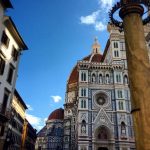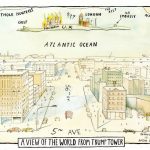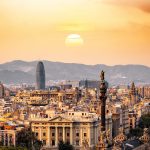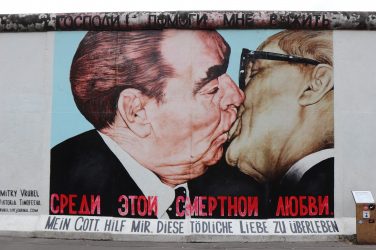A singer, songwriter, instrumentalist, voice teacher and part-time massage therapist, Mishka Adams spent the last few years living between the vibrant European capitals of London and Berlin. Inspired by the musicality of European and Austronesian languages, her work comprises a fusion of cultural and melodic expression.
It’s a chilly December morning. After a five-year hiatus, I’m reunited with Mishka Adams at a swanky venue in Granary Square, Kings Cross.
This London location is a far cry from Ilha do Mel, the sun-kissed Brazilian island where we first met.
As if to confirm the contrast, the first thing a cheery Mishka says to me is: “I don’t think I’ve ever seen you in a coat!”
We talk about our passion for European languages and Mishka recommends I read Mujeres, a collection of short stories by Uruguayan author and journalist Eduardo Galeano.
I’ve followed Mishka on social media since we got to know each other. Over the last few years, she’s played and recorded in London and Berlin, enjoying critical acclaim.
Her professional musical journey began at 19 when Candid Records signed her. She worked with the label for ten years, producing four albums.
Today, Mishka focuses on collaborative projects which bring together a range of musical genres. Most recently, she’s been working with Argentine Beto Caletti.
Born out of a love of language and song, Mishka’s style is tricky to pin down.
In her words: “The music I play is hard for me to describe, but it brings together the genres I love – jazz, folk and music from all over Brazil – through a number of different projects.”
“I love collaborating with other musicians and I consider myself lucky enough to have a musical family of people I have worked with over the span of many years and over several countries – England, Germany, The Philippines and Brazil – and who I continue to work with and be inspired by.”
I asked Mishka about her time in Berlin.
“I always felt I didn’t know enough about music to become a music student in the traditional sense.”
She said: “There was loads of music going on, and it was affordable.”
“It’s certainly a wonderful city to live and I would recommend it to anyone.”
“After a little period, it begins to open its arms to you.”
Mishka admitted the work she did in London felt very-much London-centric, while Berlin was a base for the whole of Germany, allowing her to gig all over the country.

She said: “I was doing gigs in Hamburg and Cologne; I was always travelling around on trains. And that felt really nice.”
Originally from Manila, Philippines, Mishka made a name for herself in both London and Manila on the Jazz and Brazilian music scenes, as well as touring worldwide.
I asked Mishka if being a professional musician was what she always wanted to do.
She said: “Up until I was 18, the thought of becoming a full-time musician hadn’t really ever occurred to me. My dad is a businessman and my mum is a sculptor, and we always had musicians and artists coming in and out of the house, so it was always a part of my life.”
“But for some reason, it never really clicked. I always thought that I would go to art college. And in secondary school they didn’t let me join the choir because I couldn’t read music very well.”
“I always felt I didn’t know enough about music to become a music student in the traditional sense.”
But, after some deliberation, it occurred to Mishka music was the right path.
“I love to speak different languages; I love to sing in different languages.”
I asked Mishka about the new album she is working on with Beto Caletti, and about the importance of European languages in it.
She said: “The album is lovely because it is a real combination of the things we both love.”
“I love languages – and I grew up speaking Filipino and English, so in our new album we have songs in Portuguese, Spanish, English and Filipino.”
On singing in different languages, Mishka said: “I love to speak different languages; I love to sing in different languages.”
“I love how certain melodies work better with one language than with another – and I always wonder how much the music of the language itself influences the music that’s been written in that country.”
“And also, just on a physical level, the way your mouth shapes around the different sounds, you produce a different sound depending on the language you’re singing.”
Mishka spoke about how words in certain languages express a feeling or sentiment, and, referring to the Portuguese term saudade, the power of those words to convey something that cannot be truly rendered into another language.
She said: “There’s no one word that actually encapsulates it, because it’s a feeling. And there’s no word in English that actually describes that feeling. You just have to feel it.”
I asked Mishka about the role of music as a form of escapism to get away from the daily woes we Europeans face these days.
She said: “I wouldn’t necessarily use the word escapism. Because what music does, for me at least, is bring you out of your head take you back into your body. And into your heart.”
“For example, we all have these different ideas about politics, and people argue it should be ‘this way’ or ‘that way’.”
“We can all get very strong, and angry, and righteous, about whatever it is we believe.”
“I’ve always found it deeply difficult to understand politics. There is something in me that shuts down when I get into conversations about it.”
“But what I can do is work on myself and do what I do in order to bring something to the world – I don’t know what it’s going to, in terms of politics, but if it can make someone feel something in this kind of climate, it’s very valuable – just to feel and be connected in some way.”
Mishka Adams and Beto Caletti have a European tour planned for summer 2018, with their first booked show on 11th June at Pizza Express Live, Holborn.
Cover Photo Photo courtesy: Mishka Adams










